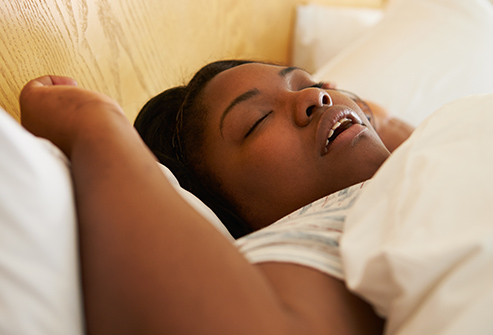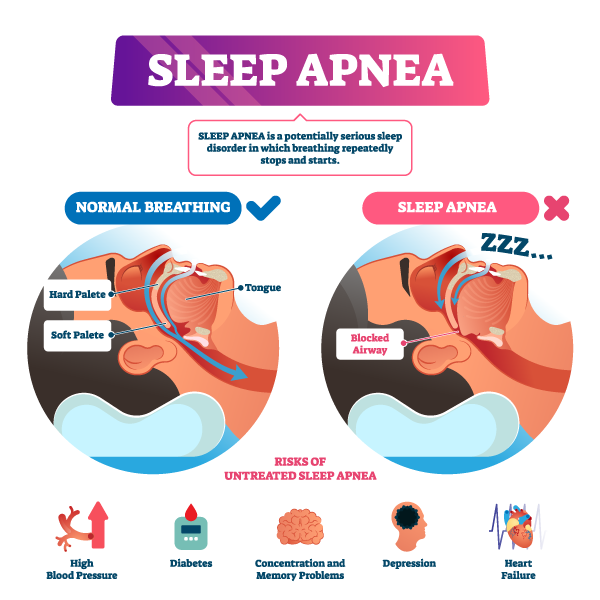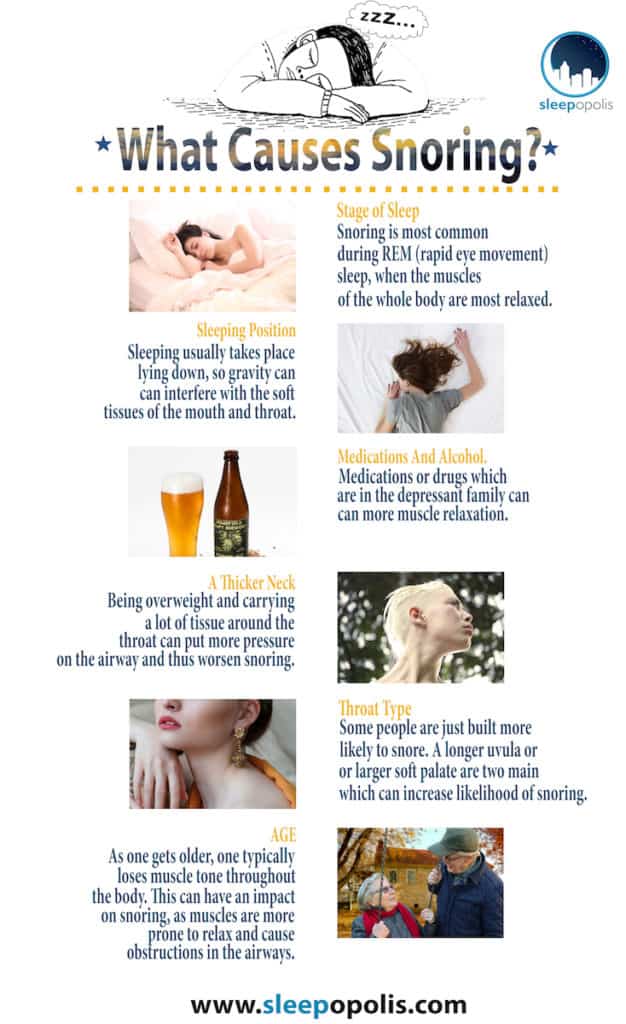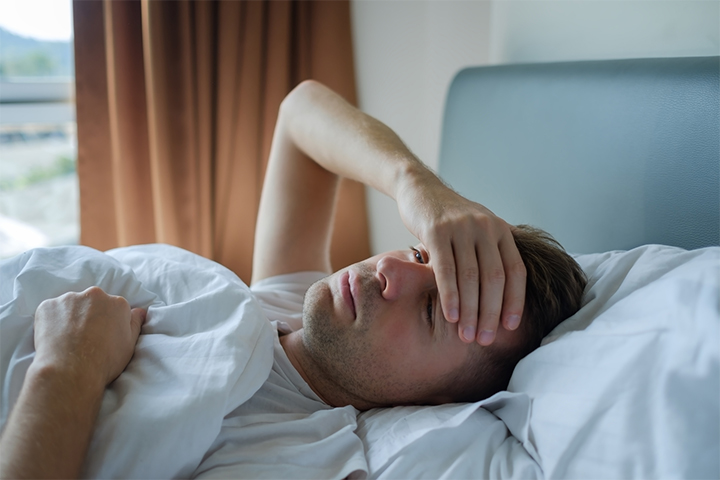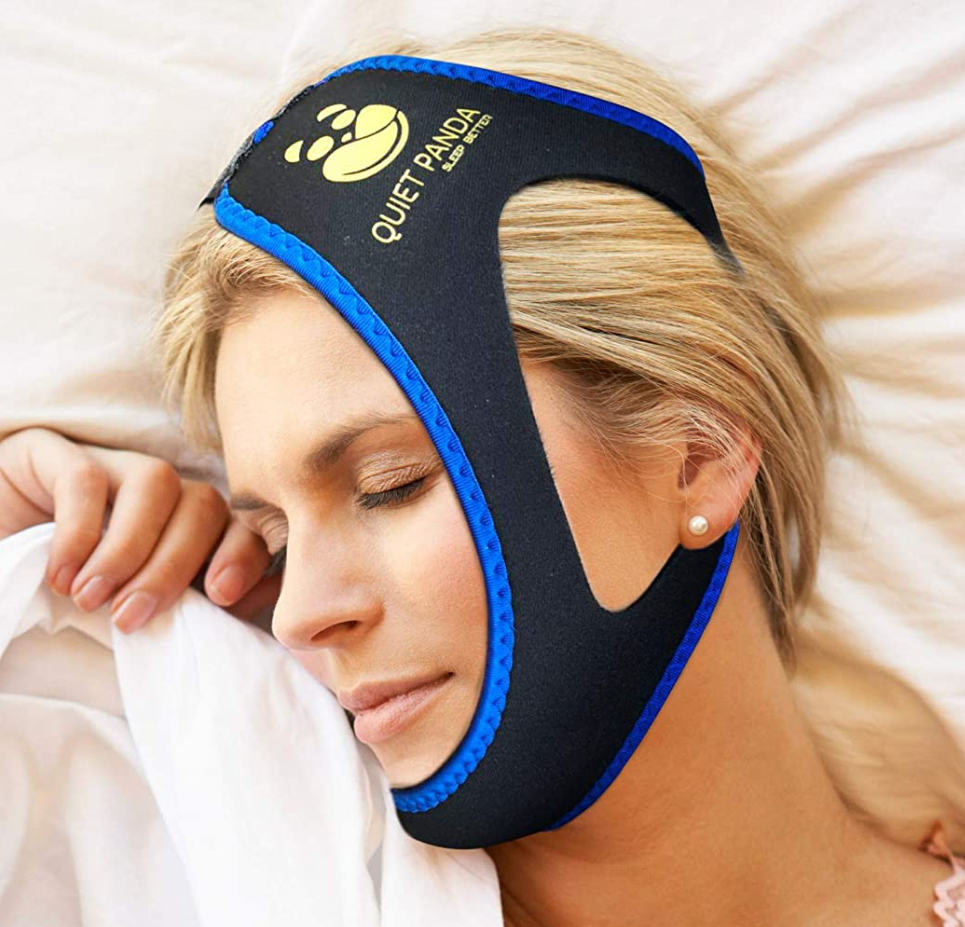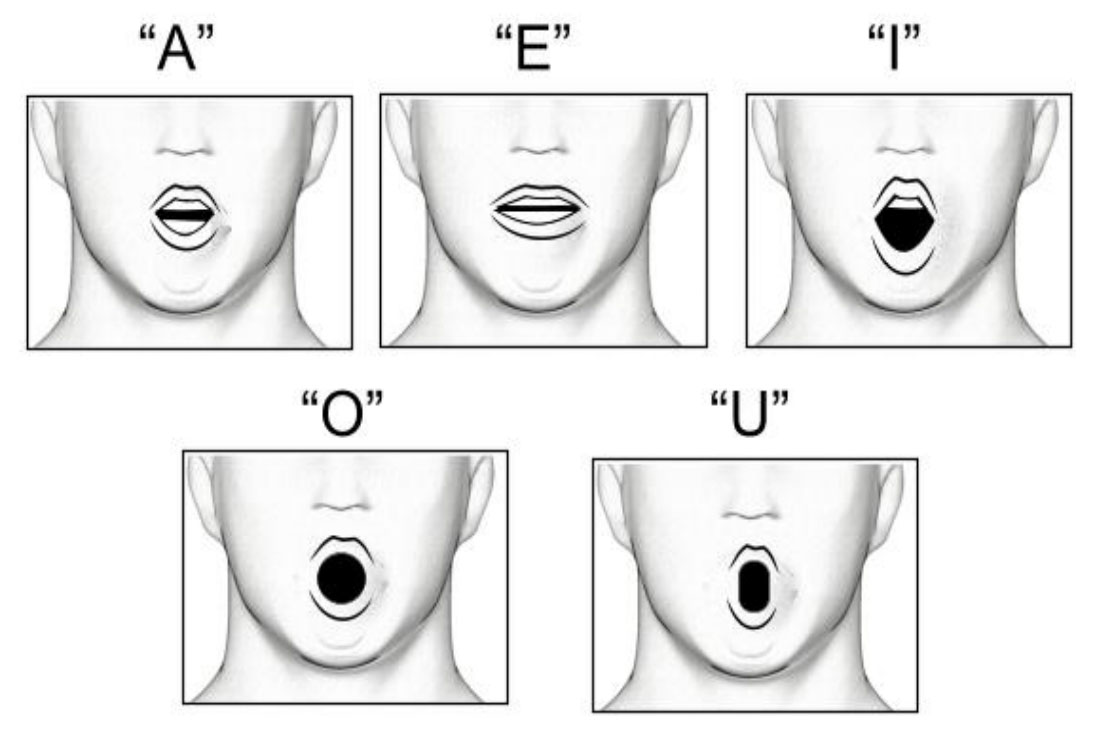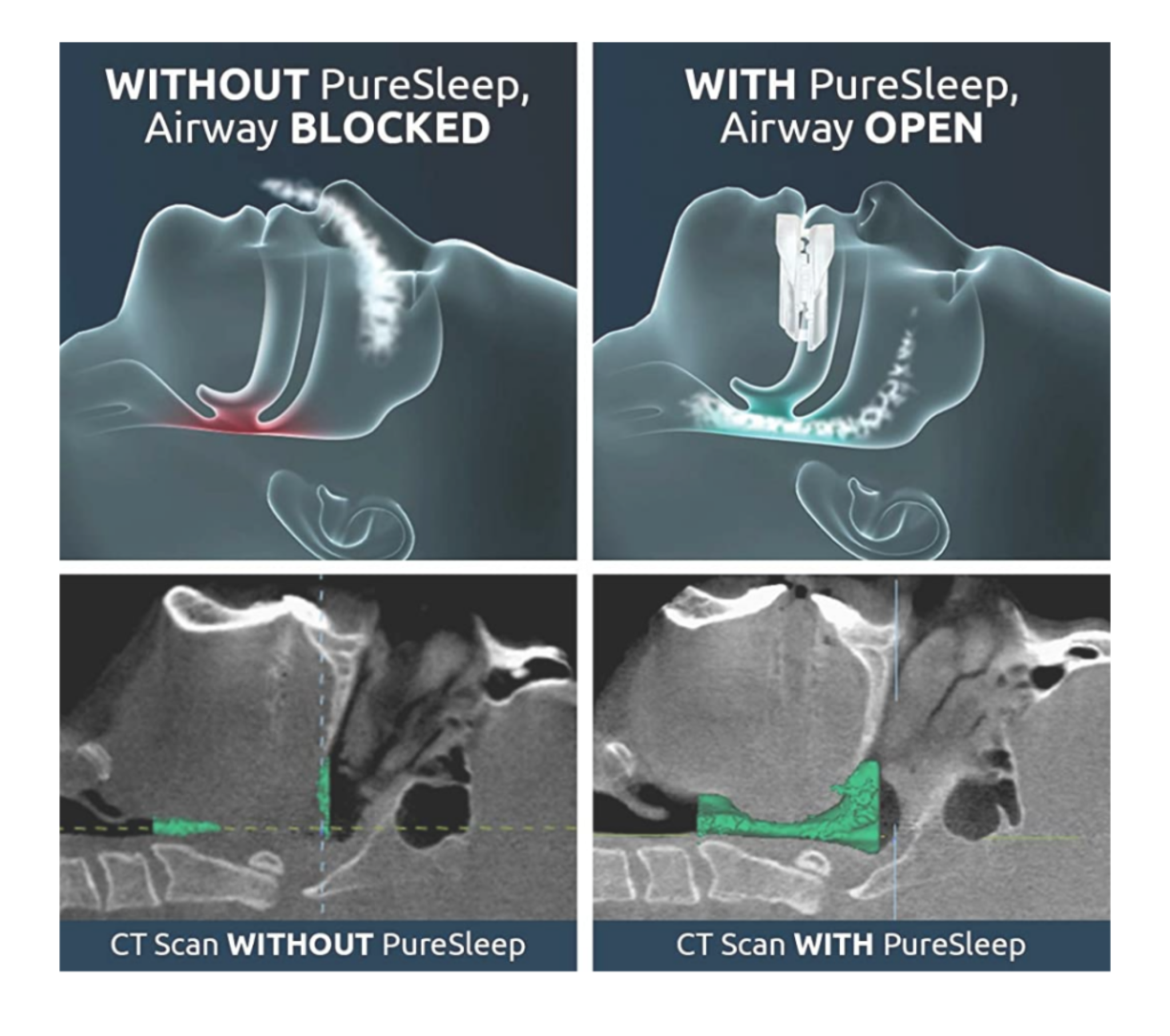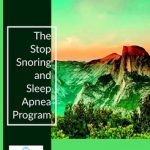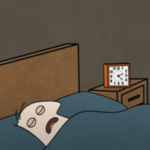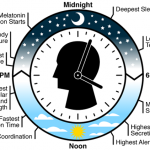How does Snoring and Sleep Apnea occur?
Everybody has snored during sleep, atleast once in their lives.
Snoring happens when your airway becomes blocked— due to your throat muscles and tissues getting too relaxed while you’re asleep.
The uvula gets heavy and lays on the back of your throat, causing the infamous, vibrating sound that we all know too well.

If a person snores every single night, all throughout the night—this can lead to severe health issues in the future.
Your tongue can also relax on the back of your throat (aka the pharynx)— blocking the airways that allow you to breathe.
This results in labored breathing that can even stop completely, for several seconds up to 30 times an hour!
When you stop breathing during sleep, it is called sleep apnea.
This ends up being a very exhausting process where you are repeatedly being jolted awake by your body releasing stress hormones— that are trying to force you to breathe again.
These two sleep conditions go hand in hand…
Snoring is actually known as a symptom of Sleep Apnea.
So Sleep Apnea is like the result of too much loud snoring.
A partially blocked airway can let only a small bit of air out through the mouth (snoring).
And a completely blocked airway prevents you from breathing for several seconds (sleep apnea).
Again, once you’ve stopped breathing…
Your body will go into fight or flight mode, and start to pump adrenaline throughout your body to wake you up, so that you can breathe again.
Usually you would wake up by coughing, grunting, or gasping for air (a bit scary right?).💀
✨We know this can be a very frustrating and scary condition to deal with— but if you continue to read on, we have some resources that can help you quit snoring and stop sleep apnea from occuring.✨
Watch the video linked above⬆️⬆️⬆️ to see a visual diagram of a human having sleep apnea.
More causes of snoring…
If you have frequent colds, or you’re a frequent alcohol drinker—you are more at risk of snoring.
Why?
Because your throat will be super relaxed when you’re drunk, and super puffy or swollen when you have a lot of colds.
Another way that your airway can get blocked, which will cause snoring is when you have too much neck fat (it can weigh down your airways allowing a small amount of air to get through).
Smoking is an irritant to your throat, lungs, and esophagus.
This can cause fluid buildup and inflammation that will prevent the the upper airways from getting airflow.
If you are overweight, obese, or you suffer from snoring too much in general—you should sleep on your side to prevent any collapsing or blocking of your main airway (throat).
If it’s possible to lose weight, then that can make it easier for you to breathe at night too.
This guy had himself filmed, so that he could see what his sleep apnea looked like.
You can see the difference of snoring sleep apnea, and peaceful, open airway sleep at the last part of the video.⬆️⬆️⬆️
The 3 different types of sleep apnea…
- Obstructive Sleep Apnea— OSA (MOST COMMON)
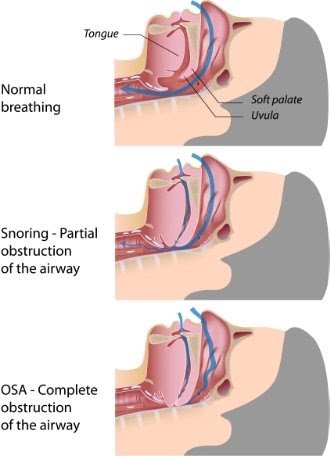 This occurs when the throat muscles relax causing the soft tissue to collapse, and this results in your breathing to repeatedly stop and start.
This occurs when the throat muscles relax causing the soft tissue to collapse, and this results in your breathing to repeatedly stop and start.
“During an OSA event, air is restricted from moving beyond the obstruction reducing blood flow to the brain.
This in turn signals the brain to partially awaken from sleep to signal the body that it needs to breathe.
This is often followed by a loud gasping, choking, or snorting sounds as the person takes a deep enough breath to fight past the obstruction.”—SOURCE.
- Central Sleep Apnea— When the brain fails to alert the muscles that help you breathe to do its job.
**When this happens, there is usually a problem with your brain stem and this is a very rare case.
- Mixed Sleep Apnea— This is a combination of both of the above Apneas, and an ENT doctor will be able to diagnose this for you by monitoring how you sleep.
How sleep apnea and snoring affects your body…
Sleep Apnea can happen a few thousand times a night.
That means that you really aren’t getting the rest that your body needs to recover.
Sleep Apnea and Snoring can put you at a higher risk for:
- Strokes
- High blood pressure
- Cardiovascular disease
- Heart disease
- Diabetes
- Lower sex drive
- Depression
- Memory loss
- Weight gain
- Dry mouth
- Headaches
- Impotence
Snoring and sleep apnea solutions…
The easiest and most popular treatments for sleep apnea are:
- To lose weight (mentioned above).
- To sleep on your side or stomach instead of on your back (also previously mentioned).
- To consume more whole plant foods, like beans, whole grains, fruits, and veggies.
- Avoid drinking alcohol before bedtime.
- To lessen or completely stop taking sleeping medications.
Try yoga specifically for sleep apnea
Sleep Apnea is the result of your blood not getting enough oxygen.
And yoga can improve your oxygen levels through many different breathing exercises.
You can improve your breathing stamina and strength with just a 15-20 minute practice before bed every night.
Yoga is known to reduce the amount of sleep interruptions you may experience.
Here are some Anti-Snoring and Sleep Apnea yoga routines you can do right before bed:
The video above can also help with thyroid problems, you just have to master breathing and making a sound at the same time…check it out!⬆️
These yoga techniques⬆️⬆️⬆️ involve taking deep inhalations while sitting in a cross legged pose.
Clearing your airways before bed can have a great effect on your sleep quality and can prevent snoring.
Try using a chin strap
Using a chin strap can help you to stop snoring and therefore get rid of the sleep apnea as well.
This is possible because a chin strap will keep your airway open, all the way through the night.
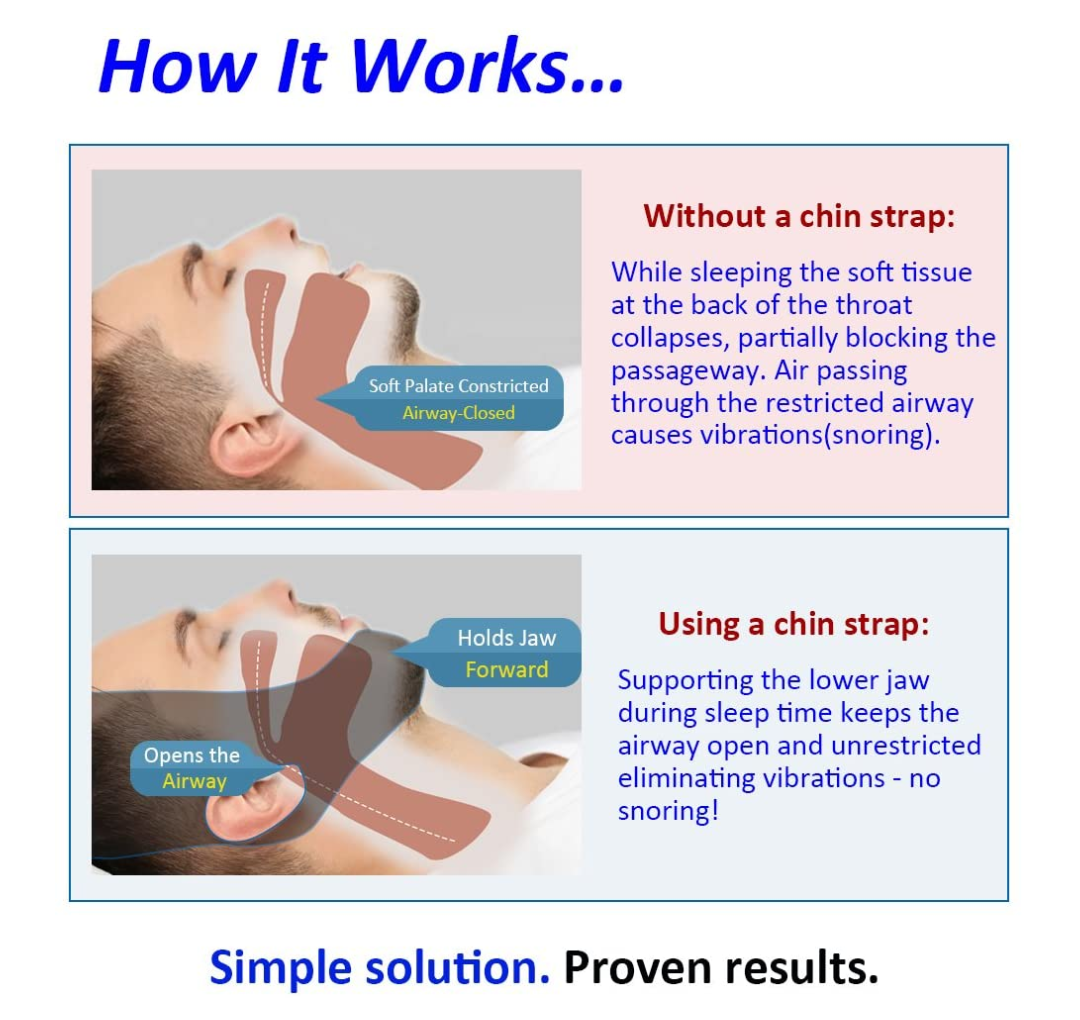
Get your very own Quiet Panda Anti-Snoring Chinstrap at the link here.
There are face stretches and tongue exercises you can do as well…
You can pronounce the vowels to strengthen the muscles in your face.
When you build up the strength in your mouth and face— your airway won’t collapse so easily during the night.
This can help you to get rid of snoring and sleep apnea.
Watch this video and follow along with these several tongue exercises— that can strengthen your mouth muscles.
Click this link to learn a bunch of mouth and tongue exercises to get rid of sleep apnea fast!
Try using a Mouth Guard
This guy tried out the 3D scanned mouth guard from his ENT (Ear, Nose, and Throat) specialist.
Check it out⬆️⬆️⬆️
The PureSleep Mouth guard is sold on Amazon and you can get it now with this link here.
Click here for a longer list of sleep apnea and snoring solutions.
Here are some more resources to help you:
- ERGONOMIC DESIGN: The set of anti-snoring nose vents with its ergonomically efficient design prevents the device from slipping out during the night, giving you and your sleep the best time to dream.
- BRUXISM SUPPORT // Prevents teeth grinding at night 7. Mouth guard should feel custom snug into your mouth.
